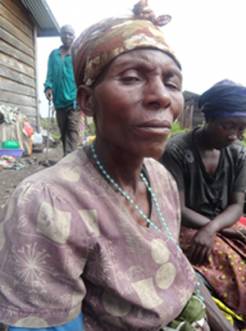By Magda Rossmann

Today, the United Nations International Day for the Elimination of Violence Against Women is observed worldwide to raise awareness of the many issues women face.
For the first time, the urgent need for action on violence that women of all ages and abilities suffer in humanitarian contexts was recognised at a High Level Panel meeting in the UK this month.
Leading humanitarian agencies, including HelpAge, met in London to endorse a global commitment that will prioritise protection of girls and women of all ages and abilities in emergency situations.
A life-saving measure
At the meeting, we put forward a statement recognising that prevention of, and response to, violence against women and girls in emergencies is life-saving. It should be prioritised from the outset of emergency alongside other life-saving interventions.
We also reiterated our commitment to core principles and actions that will:
a) strengthen our efforts to promote and protect the rights of girls and women of all ages and abilities, and
b) create a safer environment for them in conflict and natural disasters.
Violence against older women
The significance of the meeting cannot be overemphasised. Violence against women during or after armed conflict has been reported in every international or non-international war zone.
This is likely to be an underestimate as the data doesn’t cover the entirety of women’s lives and therefore does not record violence experienced in old age.
A report by the Harvard Humanitarian Initiative and Oxfam International on sexual violence in the DRC found that in South Kivu province, 10% of women survivors of sexual violence between 2004 and 2008 were 65 or older. As older women represent less than 10% of the overall population in DRC, this shows just how vulnerable this group is.
“Several rebels attacked me at home and raped me… They fired bullets so that people could not come to my aid and after they left me there half dead.” This harrowing experience of an 83-year-old woman from DRC is not an isolated incident. But it is one that we don’t often hear about.
Little data on violence against older women
What little data there is indicates that older women, many of whom have experienced gender-based violence throughout their lives, are exposed to additional types of abuse including financial, psychological and neglect. Risk of abuse can increase during emergencies when social structures are damaged and violence against women is likely to escalate.
But lack of data, underreporting and associated social stigma leave older women especially invisible – without the possibility of redress or adequate medical and psychosocial support.
“I’m married but my husband disappeared in 2001 as a result of the armed conflict. That was the reason we had to escape. It was very hard to have to leave everything behind, come here to the city and start from scratch. It meant a lot of suffering for me,” recounts a 60-year-old Colombian woman, whose displacement and the treatment she received from an illegal armed group left irreversible marks on her life.
Commitment to women of all ages
At the London meeting participants committed to ensuring that women of all ages and abilities emerge stronger, not weaker, from a crisis.
To achieve this it is important to understand and build evidence of different forms of violence against older women, and to adopt targeted approaches that reach those who are most vulnerable.
The endorsement to prioritise the needs of girls and women of all ages and abilities is a positive development, but we need strong accountability mechanisms to follow up on these commitments.
If fulfilled, older women in DRC, Colombia and more recently in Syria and the Philippines, who are often excluded from humanitarian assistance, could overcome the violence they suffer.
